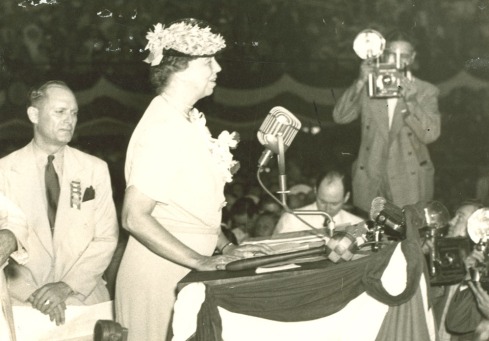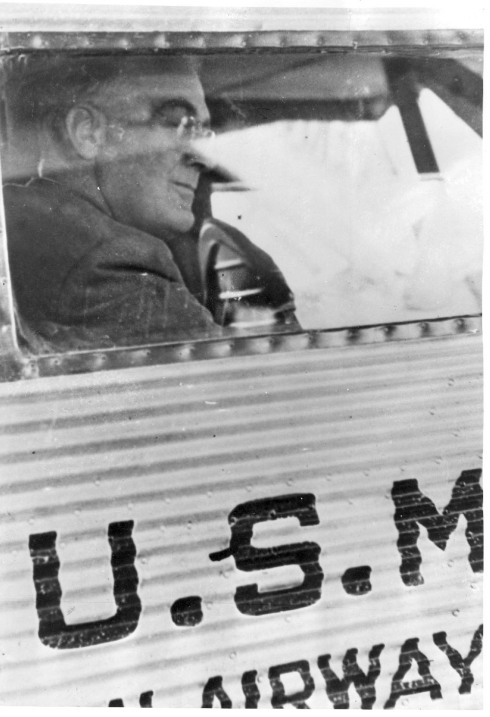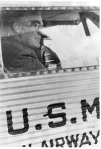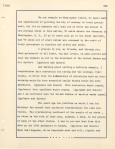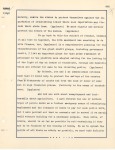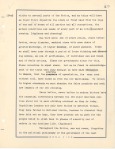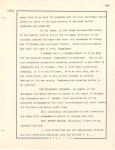You are currently browsing the monthly archive for July 2010.
July 24, 1937
“HYDE PARK, Friday—…I received the other day an appeal from an organization which had as its purpose the removal from all employment of any married women whose husbands earned enough to support them. Who is to say when a man earns enough to support his family? Who is to know, except the individuals themselves what they need for daily living or what their responsibilities are, often hidden from the public eye? There are few families indeed who do not have some members outside their own immediately family who need assistance. Added to this, who is to say whether a woman needs to work for the good of her own soul outside her home? Many women can find all the work they need and all the joy they need and all the interest they need in life in their own homes and in the volunteer community activities of their environment. Because of this I have received many critical letters from women complaining that other women were taking paid jobs who did not need them; that they were working for luxuries and not for necessities, that men were being kept out of jobs who had families to support by these selfish and luxury loving creatures. I have investigated a good many cases and find that on the whole, the love of work is not so great, those who are gainfully employed are usually working because of some real need. There are a few, however, who work because something in them craves the particular kind of work which they are doing, or an inner urge drives them to do a job. They are not entirely satisfied with work in the home. This does not mean that they are not good mothers and good housekeepers, but they need some other stimulus in life. Frequently they provide work for other people and if they suddenly ceased their activities, many other people might lose their jobs. As a rule these women belong to the creative type.
It seems to me that the tradition of respect for work is so ingrained in this country that it is not surprising that fathers have handed it down to their daughters as well as to their sons. I wonder if we are not going to feel more respect in the coming years for the women who work and give work to others, than for the women who sit at home with many idle hours on their hands. One fill their time with occupations which may indirectly provide work for others, but which give them none of the satisfaction of real personal achievement.”
July 24, 1939: FDR transfers the deed of the site for his library to the federal government.
- Informal remarks made by FDR at the FDR Library, pg1
- Informal remarks made by FDR at the FDR Library, pg2
- Informal remarks made by FDR at the FDR Library, pg3
**********
The New Deal Estore is a great place to shop for Roosevelt related books, gifts, and other treasures from the New Deal Store at the Roosevelt Library. Available at www.fdrlibrary.marist.edu, the Estore features everything from a selection of the latest books on the Roosevelts and their times, to T-shirts, ties and caps, multimedia, campaign memorabilia, and museum replicas. For items related to this week’s blog post, follow the links below:
Homes and Libraries of the Presidents by William G. Clotworthy
FDR at Home by Nancy Fogel
Franklin D. Roosevelt Library and Museum by Amy Margaret
July 18, 1940: FDR was nominated for an unprecedented third term as president.
ER addressing the Democratic National Convention in Chicago.
July 18, 1940
FDR Library Photo Collection. NPx. 69-96.
**********
The New Deal Estore is a great place to shop for Roosevelt related books, gifts, and other treasures from the New Deal Store at the Roosevelt Library. Available at www.fdrlibrary.marist.edu, the Estore features everything from a selection of the latest books on the Roosevelts and their times, to T-shirts, ties and caps, multimedia, campaign memorabilia, and museum replicas. For items related to this week’s blog post, follow the links below:
Freedom from Fear 1929-1945 by David M. Kennedy
Franklin D. Roosevelt, A Rendezvous with Destiny by Frank Freidel
Commander in Chief – Franklin Delano Roosevelt, His Lieutenants, and Their War by Eric Larrabee
July 18, 1940
“NEW YORK, Wednesday—…This is a serious time in our history, not a time for blind partisanship but a time for careful consideration of what the two major political parties have to offer, not only for the service and safety of our own nation, but for the service that may lie ahead of us because of our position in the world.
There is no such thing as isolation. We desire peace for the protection of our people from the horrors of war, but we cannot cut ourselves off from the conditions which prevail in other nations. What they suffer, we must feel one way or the other.
In a newspaper, I saw that someone said, in effect, that we are a bankrupt nation. The allusion was entirely to our financial status. No nation is bankrupt which has natural resources and production potentialities, and undaunted and unified people. These things we have, and I count on our engaging in this campaign with a determination to use our best judgment to make this country a steadying force, and a beacon of light to all people who believe in freedom and the triumph of the theory of government which is based on spiritual values.”
July 10, 1956
“NEW YORK—In spite of gray skies, we decided to have the Wiltwyck School picnic Saturday morning.
It was not actually raining, as it was on Thursday and Friday, and we hoped it would hold off until after the children had at least eaten their picnic lunch, as they then could go over to the library. Only once before have we had the picnic when it rained, and then we fed the children under every shelter we could find, not having any rooms big enough to hold them all.
Now there are more boys in the school than there were then, and while some 30 had gone home because of the delays, we still had between 125 and 130 which, together with our own family and guests, brought the gathering up to well over 150 people who had to be served.
As a rule, after they have eaten—and these youngsters really eat—they sit under the trees and I read them a story. At their request, it is usually the same one, Kipling’s “How the Elephant Got His Trunk.” The boys who have been there before tell the new boys, and they want to be proved correct, so they demand the same story and practically the same food.
Hot dogs usually run two to three apiece and some boys have been known to eat four. This year I gave them potato chips instead of macaroni, because I thought it would be easier to manage. They always have corn on the cob, which we put in our deep freeze every season, planning ahead for the picnic of the coming year.
Two kinds of salads—potato and vegetable—and then ice cream and cupcakes, with at least two helpings all around, with gallons of milk and coffee for the grownups, are on the menu from year to year.
Then we have games, for which little bundles of lollipops are the prizes. Then they go over to visit the Memorial Library.
That ends the day’s outing for the boys, but I know it means a good deal to them, for whenever I see them during the year, they ask me if we are going to have the picnic when summer comes.”
Here are some pictures from the Roosevelt Reading Festival, held on June 19th. To see pictures from some of our past events, check out the Experience our Events page on our website.
July 4, 1944
“HYDE PARK, Monday—…The fathers of our country were young men when they wrote and signed the Declaration of Independence—it was a young man’s document and it expressed the faith and hope and ideals of youth. Ex-President Hoover, in his speech the other night, said that the Republican Party recognized that this was a time when youth would take over. Comparatively few states have made it really easy to be in the armed services, still assurance was given to both the men and the women in the services that they would be consulted and have a voice in our policies for the future. This is in line with our tradition—good, sound, old American doctrine.
People in the older nations of Europe must have laughed at the young upstarts who thought they could put into words anything which would so inspire a people that a new country would be founded and shape its policies in accord with their declaration. The amusement did them no harm, and neither will it hurt the young people of today if they speak out their convictions and write from their hearts.
Many of the things which were said in the original declaration I think the youth of today will reaffirm. It would be hard to improve on: “We hold these truths to be self-evident. That all men are created equal, that they are endowed by their Creator with certain unalienable rights, that among these are life, liberty and the pursuit of happiness.” These are brave words, and the men who wrote them meant them, for they ended thus; “And for the support of this Declaration, with a firm reliance on the protection of Divine Providence, we mutually pledge to each other our Lives, our Fortunes and our sacred Honor.” That is what the youth of today is carrying out. God grant their elders help them.”
July 2, 1932: FDR accepts the Democratic Party nomination for president at the convention in Chicago; declaring “a New Deal for the American people.”
Franklin D. Roosevelt en route from Albany to Chicago to address the Democratic National Convention and accept the nomination for President.
July 2, 1932
FDR Library Photo Collection. NPx. 61-238.
**********
The New Deal Estore is a great place to shop for Roosevelt related books, gifts, and other treasures from the New Deal Store at the Roosevelt Library. Available at www.fdrlibrary.marist.edu, the Estore features everything from a selection of the latest books on the Roosevelts and their times, to T-shirts, ties and caps, multimedia, campaign memorabilia, and museum replicas. For items related to this week’s blog post, follow the links below:
1934: A New Deal for Artists by Ann Prentice Wagner
FDR’s Alphabet Soup, New Deal America 1932-1939 by Tonya Bolden
Franklin D. Roosevelt and the New Deal by William E Leuchtenburg
Nature’s New Deal by Neil M. Maher
The Coming of the New Deal, the Age of Roosevelt by Arthur M. Schlesinger Jr.




